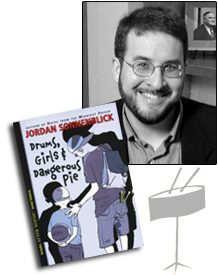Gobbling up Jordan Sonnenblick’s DRUMS, GIRLS, AND DANGEROUS PIE and AFTER EVER AFTER

I admired Jordan Sonnenblick before I even knew his books. Like me, he put in a number of years teaching in the public schools of Houston through Teach For America. Plus he’s a funny, unassuming guy who is unstinting when it comes to sharing his experiences. Among other things, he gave me heaps of advice about managing publicity and pulling off high-quality author visits.
Maybe all this awesomeness contributed to the moment of fear that struck my first-time-author heart: what if I don’t like the work as much as I like the person?
Not to fear, though: Drums, Girls, and Dangerous Pie and the companion novel After Ever After hit all the right notes. These are middle-grade fiction at its best. Put it out there for guys or girls. Serve it up in class or outside. These books are real without crossing any of those tricky boundaries that are so worrisome for librarians and teachers of the younger crowd.
Here’s a quick summary of the two books (excerpted from the positive Kirkus reviews of the books) before I touch on some of the things that I liked best:
Drums, Girls, and Dangerous Pie (2005): Steven Alper, who is untalented in sports but terrific on the drums, is giving his pesky five-year-old brother Jeffrey oatmeal when Jeffrey, who has been complaining recently that his “parts hurt,” falls off a stool and gets a nosebleed that just won’t quit. That night Steven finds out that Jeffrey has leukemia.
After Ever After (2010): In this companion novel to Drums, Girls & Dangerous Pie (2005), Steven’s little brother Jeffrey, now in eighth grade and in full remission from leukemia, discovers that happily ever after isn’t quite what he expected.
I accidentally listened to these books out of order, hearing Jeffrey’s story in After Ever After before Steven’s. It didn’t really matter, though, because After Ever After really is a companion book, not a sequel, and nothing is lost for readers who haven’t read D,G, and DP. The self-deprecating humor and general wholesomeness of the guys is a common thread, but Steven and Jeffrey’s challenges, strengths, and outlooks are appropriately distinguished. Together, the two novels offer a view of how childhood cancer affects–and continues to affect–families.
After Ever After in particular helps readers think about something that they might not consider: the many costs and complications of life for a childhood cancer survivor. Jeffrey and his friend Tad (also a cancer survivor) have to live with side effects from treatment that touch everything from their fine motor control to their walking ability, their memory to their problem-solving skills. (FYI I was intrigued to hear mention of Gleevec as a treatment for one of the boys as this is the medication my Dad has been on as a treatment for gastrointestinal cancer.)
For all their differences, both Steven and Jeffrey are the kind of sweet but not too sweet boys I hope that Liam will grow into. The books are clean but not squeaky; Sonnenblick’s pitch-perfect voice keeps the reader from ever thinking for a second that the writer is writing at a younger audience. This is writing for middle-grade readers at its best.
I know I mentioned the humor already, but really. Really. So funny. Like Tad in After Ever After calling his little sister the “emergency replacement child” that his parents cooked up just in case he croaked. In light of my colossal inability to generate humor, this kind of funny floors me.
Liam, will you please read these books with me when you are approaching your middle-school man-child years?




